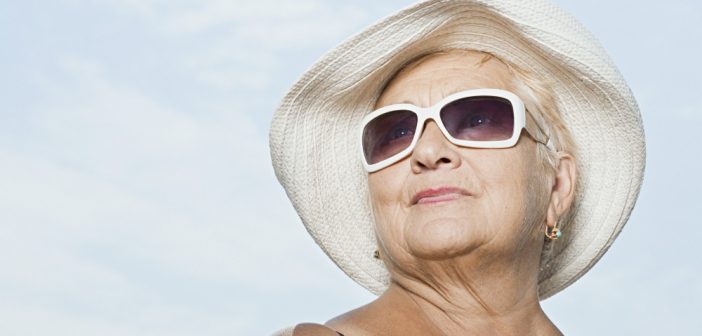You’ve spent your whole life hiding from the sun and coating yourself with sunscreen. Now you are in your golden years and should be able to relax, right? Or maybe you’ve been a sun worshipper your whole life and turned a cold shoulder to sunscreen without getting skin cancer. There’s no sense in changing that now, is there?
Although it may seem that preventing skin cancer and putting on sunscreen is a young person’s problem, it is just as important for seniors. Here are four things to know about sunscreen and protecting your skin.
Skin cancer risk increases with age
Skin cancer takes years to develop, but that doesn’t mean seniors are out of the woods. “As we age our skin gets thinner,” said Sarah Hilton, a 20-year geriatric nurse, and director of advisory services for skilled nursing. “Our skin changes along with a decreased ability to heal with age.” Hilton said these changes, along with a lower immune system, more time outdoors, and more exposure to the sun creates a greater risk for skin cancer.
Close to 50 percent of Americans age 65 and older have had skin cancer, and white males over age 65 have had the highest increase in melanoma of any group. More than half of skin cancer deaths are also people over age 65. The more sunburns a person has had in their life, the higher their chances of developing skin cancer. Although you can’t change past exposure, it’s never too late to start protecting your skin.
How does sunscreen work?
Sunscreens are made up of either chemical or mineral components that help block UVA and UVB rays. Chemical ingredients block the absorption of the rays, while physical mineral ingredients like titanium dioxide or zinc oxide block the rays from hitting the skin. A broad-spectrum sunscreen offers protection against both kinds of rays.
Related link: Are Medications Throwing Shade on Outdoor Fun?
Not just any sunscreen will do
Sunscreens have different SPF ratings, and not all are created equal. An SPF 15 sunscreen filters out 93 percent of UVB rays and, in theory, protects skin for 15 times longer than no sunscreen at all. an SPF 50 sunscreen filters out 98 percent of rays and protects skin 50 times longer than no sunscreen. The best bet is a sunscreen with SPF 30 to 50 or more. While a higher SPF number should protect skin longer, any sunscreen should be reapplied at least every two hours, or more often if a person has been in the water or sweating.
Protect yourself beyond sunscreen
While sunscreen is a vital component in preventing skin cancer, many more steps can be taken to minimize exposure to harmful UV rays. Cover up with hats, sunglasses and protective clothing whenever possible. If overheating is a concern, try wearing lighter clothing that offers UV protection. Stay indoors during peak sunlight hours in the middle of the day and choose a shady spot when enjoying the outdoors.
Related link: Signs Your Mole Needs To Go
Skin protection is crucial at any age. Using sunscreen and physical barriers to sun exposure are some of the best ways to prevent skin cancer. Minimize your risk by taking steps to protect your skin. Give your skin a generous helping of sunscreen before you head outdoors and don’t leave your hat behind. Keep your skin happy and healthy as you age with a little love and attention.
This article was originally published by The Daily Herald.




